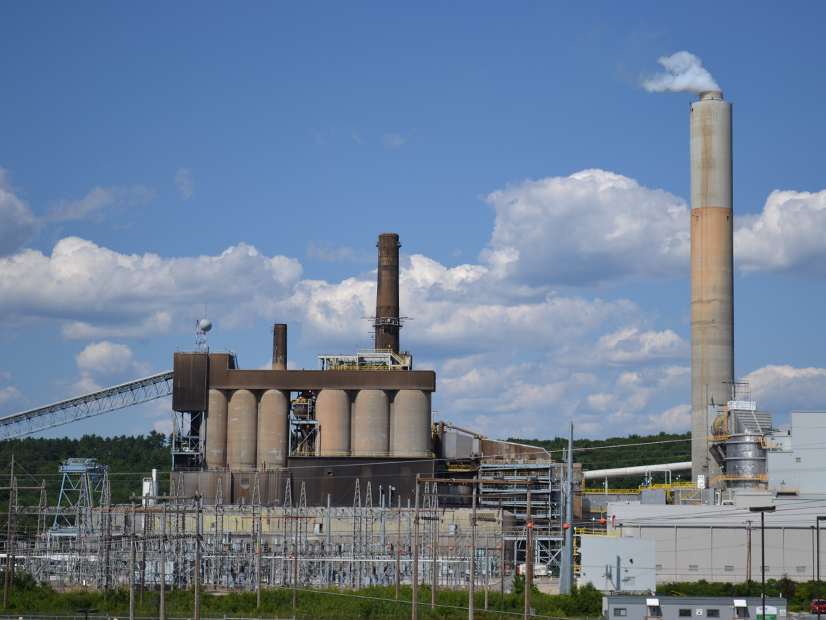
Granite Shore Power has reached an agreement with EPA, the Sierra Club, and the Conservation Law Foundation to retire New England's last coal plant by 2028.
Granite Shore Power has reached an agreement with EPA, the Sierra Club, and the Conservation Law Foundation to retire New England’s last coal plant by 2028, the company announced March 27.
Along with the 482-MW Merrimack Station, the company agreed to retire Schiller Station, a 155-MW unit that can burn coal, by 2025. Both generators are in southern New Hampshire.
“This historic victory is a testament to the strength and resolve of those who never wavered in the fight for their communities and future,” said Ben Jealous, Sierra Club executive director.
Jealous applauded both the climate and public health benefits of retiring coal resources, noting that air pollution from coal significantly increases risks of asthma and heart disease in nearby communities.
Granite Shore plans to replace both power plants with clean energy resources, including a large battery at the Schiller station site and co-located solar and storage at the Merrimack site.
“The New Hampshire Seacoast is an area of high energy demand and through the repowering of Schiller Station, we will provide carbon-neutral power to support the businesses and families of New Hampshire,” said Granite Shore CEO Jim Andrews. “Our facilities are ideally situated near the infrastructure necessary to transition the region to the next generation of energy resources.”
Climate and environmental organizations in the region have long advocated for closing New England’s remaining coal plants. Coal generation in the region has fallen dramatically over the past two decades. According to ISO-NE, coal accounted for just 0.5% of the region’s generation in 2023, compared to about 40% in 2000. The decline has coincided with a substantial increase in natural gas generation.
“The transition that Granite Shore Power has announced is a testament to the continued commitment to invest and support the many needs of electricity consumers both today and in the years to come,” said Dan Dolan, president of the New England Power Generators Association.
“As some older, less-efficient power generation gives way to newer sources, it is incumbent on industry and policymakers to continue the hard work to enhance the electricity market to get reliability, affordability and a clean energy future right,” Dolan added.
In recent years, the writing has appeared on the wall for the region’s remaining coal plants. Schiller Station has not operated since summer 2020 but has not officially retired. Merrimack Station remains in operation but failed to win capacity supply obligations in the forward capacity auctions for the 2026-27 and 2027-28 procurement periods. (See FCA 17 Shows Clean Energy Boost, Endgame for Coal in New England.)
Merrimack also exceeded federal emissions limits in a February 2023 stack test and has had to abort multiple attempts to retake the test over the past year. The New Hampshire Department of Environmental Services has said the plant is not in compliance with federal standards, which could make the facility subject to fines.
“It was clear that this day was coming,” said Nathan Phillips, a member of the No Coal No Gas campaign and a professor of ecology at Boston University. “But yet, when you see them say it themselves, it’s still monumental … it’s a shock but not a surprise.”
Phillips added that the announcement is “a shot in the arm to all of us to escalate our campaign to every other dirty peaker plant going forward.”
The Sierra Club and the Conservation Law Foundation also emphasized their aim to retire all remaining fossil fuel generators in New England.
“Now we must vigorously push for the phaseout of other polluting fuels like oil and gas,” said Tom Irwin, vice president of the Conservation Law Foundation in New Hampshire. “New England is positioned to be a leader in building a future where our energy comes from 100% clean sources, and fossil fuels no longer pollute the climate and threaten the health of our communities.”
Along with the Merrimack and Schiller Stations, the Mystic Generation Station, a 1,413-MW combined-cycle plant, is set to retire in May. While the New England states have ambitious clean power goals for the coming decades, some energy officials have expressed concern about retirements outpacing deployment.
“We cannot remove conventional generation before we stand up its replacement,” said Charles Dickerson, CEO of the Northeast Power Coordinating Council, at an event March 22. “We need to have renewable resources that we can control.”



